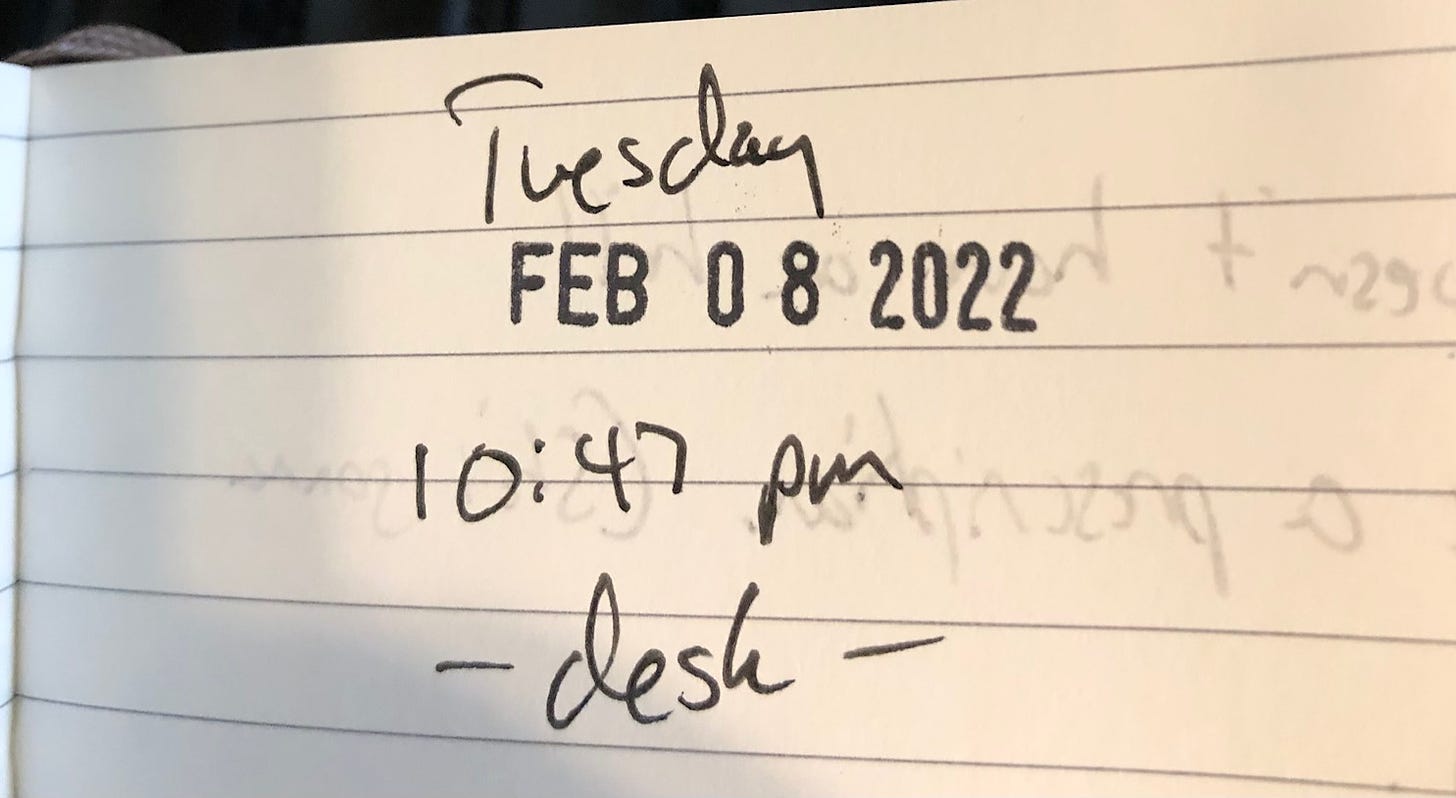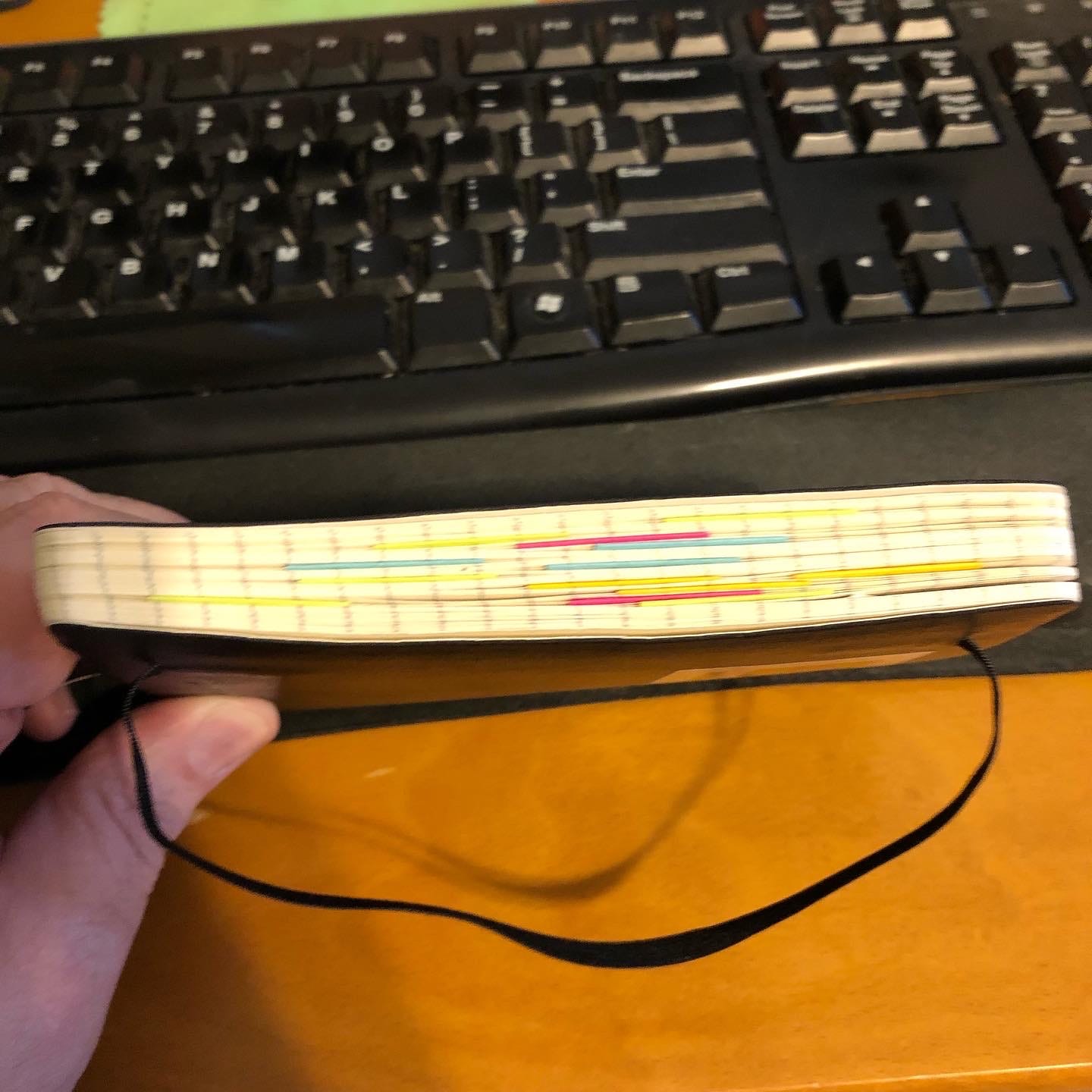Notebook #76. “Lick Local” sticker by Golden Cow Creamery.
Gifted reader Tripp sends in this question:
Would love to hear more about your journaling habits. What broadly speaking do you write about? How do you maintain the discipline daily? How does it help(?) you as a writer?
The first rule of doing a journal is that there are no rules for how to do a journal. Everybody I know who does one does it a different way, on a different schedule, with a different purpose.
So don’t take my method (if it even counts as a method) as gospel. Play around for a while. Have fun. The only advice I have is to get your thoughts on the page. Over time, I believe, it’ll become a treasure for you.
I started my first journal on April 6, 2005, in a little black Moleskine notebook. I stopped and started for a while and didn’t get serious until 2008. I am now about halfway through journal no. 76. The notebook I use has 192 pages. Seventy-five and a half notebooks times 192 pages is about 15,000 pages. At roughly 50 words a page — I tend to scrawl — that’s somewhere in the neighborhood of 750,000 words.
My first book was about 75,000 words. So one way to look at is that my journals are the equivalent of 10 books.
They would be weird-ass books, though. What you would think of as normal journal entries are in there — I write some sort of diary entry pretty much every day. Sometimes I write 10 or 12 pages; other times it’s just a quick log of how the day went. But in the middle of all that there’s also grocery lists, song lyrics, found art, vacation ideas, and a million other tidbits and digressions.
(The one thing I don’t use my journal for is taking notes when I’m working on a story. For that I use old-fashioned reporters’ notebooks — they’re cheap, and it’s easier to flip the pages when you’re interviewing somebody in the field.)
I’m jotting stuff in my journal all day long. It has a soft cover so it’s flexible enough to keep in my back right pants pocket (where I used to keep a checkbook, back when you never knew when you might have to write a check). When I’m sitting at the doctor’s office, or waiting for a friend at lunch, I’ll pull it out and just write whatever’s on my mind. This is a great way to keep from automatically pulling out your phone. Of course, sometimes I still pull out my phone. Hard habit to kick.
Just before bed, I recap the day. Lately I’ve taken to marking the time and where I’m writing from:
I stole the date stamp idea from Austin Kleon, who has his own brilliant series of posts about how he captures the day — he’s an artist as well as a writer, and his system of diaries and logbooks is beautiful to behold.
Here’s a peek at the beginning of an entry from the Monday after Christmas:
If you can’t read my writing: We watched the Welsh detective show SHETLAND, and I finished reading Dave Grohl’s memoir THE STORYTELLER, a Christmas gift I devoured in three days. Later on in that day’s entry I wrote about calling the vet after the cat ate some string. Alix (my wife) and her mom made chocolate chip cookies. Alix wasn’t feeling great and was thinking about getting a COVID test. (She ended up testing negative.)
What I’m getting at here is, you don’t have to wait for earthshaking stuff to write about.
Of course, some days there IS earthshaking stuff to write about — that first journal entry back in 2005 was on the day I found out I was a finalist for a Pulitzer. Alix and I were in Seattle at a conference and walked around giddy all day. There are lots of great days in the pages. But there are also the days my sister died, and my mom, and Alix’s dad, and our dog.
And then there are the in-between days, where nothing much happens but I have time to think and the important part of the day is taking a moment to write down those thoughts.
When I wrote THE ELEPHANT IN THE ROOM, my journals were a vital resource. They fleshed out scenes I had half-remembered, and brought back moments I’d forgotten about. I guess this gets to one rule that I have for my journals: I tell the truth. I don’t write EVERYTHING — I don’t think it’s important to spill every last messy detail of life onto the page — but what’s in there is true, to the best of my knowledge.
(But that’s just my rule. Like I said, there are no rules. If you want to write fiction, have at it.)
Every so often I go back and mine old notebooks for ideas. I’ve developed a little system to mark places where I have something I might want to go back to later. These are just little Post-it notes folded over the edge of the page:
The yellow ones are thoughts on my current book, the blue ones are ideas for this Substack, the purple ones are ideas for other stories of one type or another, and the orange ones are notes on self-care (new year’s resolutions and that sort of thing).
I wish I had marked up all the notebooks like that from the beginning. I’m not sure I’ll ever get back through all of them. But whenever I do look, I always find some idea I’d forgotten.
It’s also a useful reality check for me, especially when I’m going through a tough time. I’ve done entries even on days when I was angry or sad or depressed. Going back and reading those entries, knowing that I made it through OK, reminds me I can survive hard things.
All in all, I spend less than an hour a day on my journal — quite a bit less, most days. But add it all up and it’s some of the most important time of my life.
I’m always fascinated to hear how other people do this sort of thing — please post your system in the comments.
And if you’ve never tried doing a journal, try it! If you don’t like it, no one else will ever know.







I have tried. I do have notebooks I write in most days, but I guess they aren't really journals, they are more writing/project specific. My problem is that I seem to end up writing such whiney-ass stuff, I disgust myself. This was especially true during the lockdown days of covid, when I (wrongly) figured that a pandemic should lend itself to journaling. The sticky notes are brilliant... I remember one teacher who would do a sort of index on the outside cover of each notebook, so he could see roughly what was inside. I'm trying that out, but I like your color-coded stickies!
Thanks. I enjoyed hearing about the colored sticky notes -- never seen that before. I like creating an index in the opening 10 or so pages where, unlike a table of contents or an organized system, it's just simply the page numbers and what is on them. I don't index each page (I index the page numbers for each month, e.g.) but some pages I do index individually like "Books I've read this year" or "shows to watch." I find this helpful in finding things quickly when I look back on previous years' journals. Thanks for sharing! Agree with you on writing even on the bad days and seeing, from a distanced perspective, the grit and resilience we all can have.